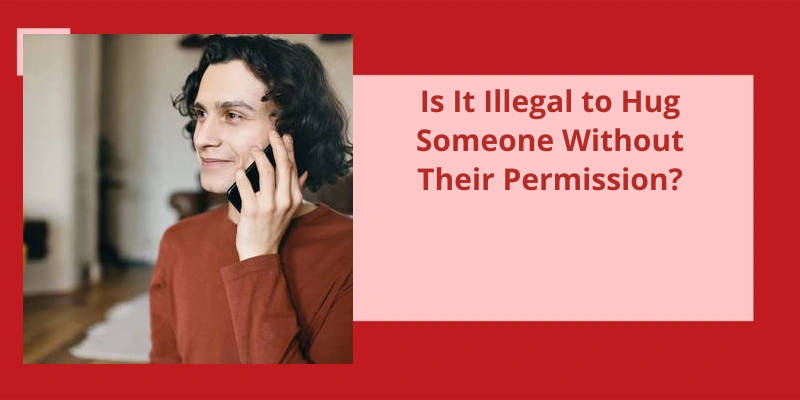In a world that emphasizes personal boundaries and consent, the question of whether it’s illegal to hug someone without their permission carries significant implications. When it comes to physical advances, various actions fall under the category of sexual assault, encompassing a wide array of behaviors that disregard an individual's autonomy and comfort. These actions may range from intentionally grabbing or touching someone in a manner they find unpleasant, to coercing them into physical contact against their will. Crucially, this also encompasses forcibly hugging or kissing someone, as well as subjecting them to any form of unwanted physical contact. Understanding the legal and ethical ramifications of such behavior is key to promoting a society that values consent and respects personal boundaries.
Is It Illegal to Randomly Hug Someone?
When it comes to hugging someone without their permission, the question of legality arises. The answer to this question depends on the context and the consent of those involved. If you’ve received explicit consent from the person you intend to hug, then it isn’t an issue. Consent serves as the foundation for any physical contact, ensuring that both parties are comfortable and willing to engage in such acts.
Assault is generally defined as the intentional act of causing another person to apprehend immediate harmful or offensive contact. Physical contact without consent can be seen as offensive and a violation of personal boundaries.
To navigate situations where consent may not be explicitly stated, it’s crucial to be skilled in interpreting body language. Paying attention to non-verbal cues such as crossed arms, tense body posture, or signs of discomfort can provide valuable information about a persons willingness to engage in physical contact. By attuning ourselves to these signals, we can better gauge whether or not someone is open to receiving a hug. However, it’s important to note that body language isn’t an infallible indicator, and misinterpretations can still occur.
While this may feel awkward or unnecessary in familiar relationships, it’s still a means of honoring personal boundaries. By seeking explicit consent, we promote a culture of consent and respect, where individuals feel comfortable expressing their preferences regarding physical contact.
It’s always safer and more respectful to ask for consent first or become adept at understanding and interpreting body language. Respecting personal boundaries and fostering a culture of consent is crucial in ensuring safe and enjoyable interactions with others.
People have diverse preferences when it comes to personal space and physical contact. While many may enjoy hugs as a way to express affection, not everyone feels the same way. It’s important to understand that not wanting to hug others is perfectly normal and valid, even without underlying trauma, mental health conditions, or personality disorders. Society often falsely portrays being a hugger as the default norm, but the truth is that everyone is unique, and what feels comfortable or uncomfortable varies from person to person.
Is It Normal to Not Want to Hug People?
Is it normal to not want to hug people? The short answer is yes. Contrary to popular belief, you don’t have to have experienced trauma, or suffer from a mental health condition or personality disorder to not enjoy hugs. It’s completely valid to just not like them, and this preference should be respected. Society often puts a lot of pressure on individuals to be affectionate, but being a hugger isnt an innate or default quality in all human beings.
It’s important to recognize and honor our own boundaries when it comes to physical contact. Just like any other personal preference, whether it’s about food, music, or hobbies, our likes and dislikes are unique to us. Some people thrive on physical touch, finding comfort and affirmation in hugs, while others may not feel the same way. And thats perfectly okay.
In fact, it’s crucial to remember that everyone is different. Some people may feel anxious or uncomfortable with physical touch, regardless of whether it’s a hug, handshake, or even a pat on the back. This can be due to a variety of factors, such as personal space needs, sensory sensitivities, or simply a preference for expressing emotions in other ways.
The key is communication and consent. It’s important to establish clear boundaries and respect the preferences of others. Just as it isn’t okay to hug someone without their permission, it’s equally important to recognize that not everyone wants or needs a hug. Understanding and accepting these differences can promote healthier relationships and more authentic connections.
So, if youre someone who doesn’t particularly enjoy hugs, don’t let societal expectations or pressures make you feel abnormal or flawed. Being true to yourself and expressing your boundaries is a fundamental part of self-care and self-expression. Remember, embracing your own preferences and being respectful of the preferences of others is the foundation of building healthy relationships.
How to Communicate Your Preference for No Physical Contact
- Respectfully explain your preference for no physical contact
- Clearly express your boundaries and personal space needs
- Use non-verbal cues to communicate your preference, such as stepping back or crossing your arms
- Politely decline physical gestures or offers for physical contact
- Suggest alternative forms of greeting or interaction, such as a smile, wave, or verbal greeting
- Acknowledge and validate others’ preferences for physical contact
- Be open and understanding towards different cultural norms and practices
- Educate others about your preference and the reasons behind it, if necessary
- Set personal boundaries and feel empowered to enforce them
- Remember that it’s okay to prioritize your comfort and well-being
Conclusion
In conclusion, it’s crucial to recognize and respect personal boundaries when it comes to physical contact. The act of hugging someone without their permission can fall under the category of sexual assault, as it involves intentionally invading someone's personal space and disregarding their autonomy over their own body. It’s essential to foster a culture of consent and educate ourselves on the importance of obtaining permission before engaging in any physical advances. By doing so, we can create a safer and more respectful environment for everyone, where boundaries are acknowledged and respected.






